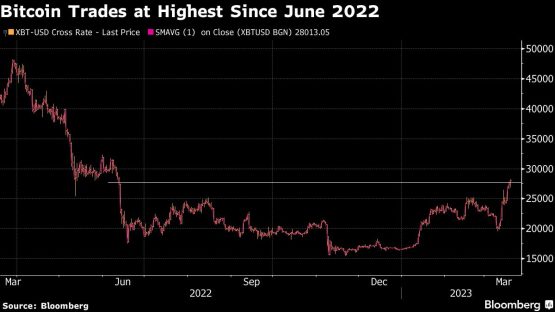Turmoil in the banking sector, hotter-than expected inflation data, and renewed hopes for a dovish Federal Reserve has Bitcoin reaching levels not seen in about nine months.
The largest digital coin topped $28 000 for the first time since June 2022, trading at around $28 200 at 9:45 a.m in London on Monday. Bitcoin is now up more than 70% since the start of the year. Other tokens have rallied as well, with Ether gaining almost 50% since December 31 and Solana, one of last year’s most beaten-down coins, more than doubling.
Crypto markets have now regained all ground lost since hedge fund Three Arrows Capital and crypto lender Celsius Network collapsed during a tumultuous stretch last summer. The havoc in traditional banking markets, which saw Swiss lender Credit Suisse Group AG lurch into a government-mediated takeover by rival UBS Group AG on Sunday and several US lenders fail in past weeks, is propping up crypto by fueling expectations that central banks will have to pause rate increases.
Traders waded high levels of uncertainty last week in markets. US two-year yields fluctuated wildly, and the Cboe Volatility Index, the so-called fear gauge also known as the VIX, spiked above 30. But Bitcoin kept steadfast — and straight up.
“Bitcoin is correlated with liquidity conditions and real rates. Real rates have declined, liquidity conditions have expanded, and it looks as if we’re entering a new regime,” said Ilan Solot, co-head of digital assets at Marex.
Broader markets fluctuated in the past week after a handful of US lenders failed, and fresh concerns arose around Credit Suisse before UBS agreed to buy its fellow Swiss bank on Sunday. In the fallout, some investors have called on the Fed to pause interest rate hikes. But midweek data showed that core CPI advanced more than expected, a reminder that the fight against inflation is far from done. It’s unclear how the central bank will respond to the conflicting signals at this week’s Fed meeting.
That uncertainty troubled many corners of the financial world, but emboldened Bitcoin bulls who see the digital asset as a hedge against inflation, despite last year’s evidence to the contrary. In 2022, a series of bankruptcies and scandals pushed the price of Bitcoin down more than 60%.
On Monday, crypto lender Matrixport raised its price target for Bitcoin to $36 000 — a level last seen just before the collapse of stablecoin TerraUSD in early May last year. That event touched off contagion in crypto markets that culminated with the bankruptcy of Sam Bankman-Fried’s digital-asset exchange FTX six months later.
“There is a macro liquidity story developing that has been historically very powerful for Bitcoin,” Markus Thielen, Matrixport’s head of research, wrote in a report announcing the revised price target.
The token also rose in spite of internal strife in the digital asset space. USD Coin briefly lost its peg with the dollar this month, and the US Securities & Exchange Commission is doubling down on the belief that most digital assets qualify as securities.
S&P 500 futures fell on Monday, tracking broad declines in global equities as markets digested the UBS deal for Credit Suisse. If Bitcoin were still trading like it did for much of 2022, the token would have slumped alongside US stocks. But this month, the correlation between the digital asset and the S&P 500 has dissipated.
“In this instance, we are definitely seeing people look to Bitcoin,” said David Martin, head of institutional coverage at digital asset prime brokerage FalconX.
© 2023 Bloomberg

